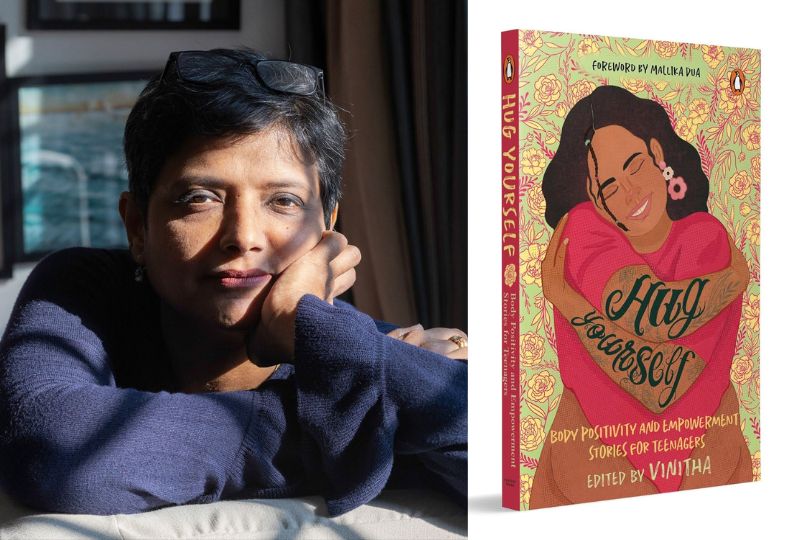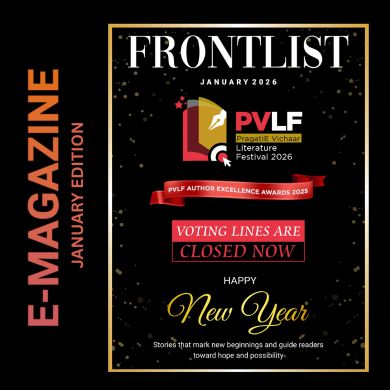Interview with Vinitha Author of Hug Yourself
Hug Yourself explores body positivity and emotional healing through diverse stories, empowering young adults to embrace self-love and mental well-being.on Oct 15, 2024

Vinitha is an award-winning author and editor who also paints and writes poetry. An ex-journalist and columnist, Vinitha has written over thirty books for children. Her stories are part of CBSE and ICSE curriculum. Her book Ammu and the Sparrows won the Neev Literature Award 2021 and is a part of Parag Honour List, while Jamini Roy's Unbroken Lines has received much critical acclaim. A scholarship she won at Hedgebrooke's Writers in Residence Program has led her to write her first not-for-children book--a food memoir.
Frontlist: As the editor of Hug Yourself, what was your vision when curating the different chapters? How did you select the themes and contributors for this anthology?
Vinitha: Hug Yourself started as a conversation between me and a friend. We had much to share. We agreed that in our entire lives, adolescence was the hardest; this despite it being pre-internet days. Was it possible that today’s young struggle even harder than we did, not knowing all the possible stories of others struggling as well?
In the social- media explosion that we live in, it is easy for all of us, especially our young, to forget that the reality portrayed in the digital domain is, in fact, fabricated. Photographs and videos are more about angles, lighting, poses and engineered situations of glamour. All the content spun may is be designed to keep you hooked, stay on the app and lure in more followers. But what it also does is fuel more self-doubt, more discontentment, and more envy, while lowering confidence and creating unrealistic aspirations. We also realised that there was not a single book for young adults on body positivity. That's when we thought, "how about we create that book?"
My friend decided that she would find the funding to bring this project into fruition. I have been writing and editing for a long time now. I decided that I would bring in the authors. Without really planning more than this, I put a call on Facebook for stories. The only criteria for participation was that the contributors were established womxn writers. I knew that when I had a pool of stories, I would know how to go forward with them.
Frontlist: The book focuses on self-love and emotional healing. How did you ensure that each chapter complemented the overarching message of the anthology while bringing unique perspectives from different authors?
Vinitha: I was collaborating with well-known experienced authors, who not only know the craft, they also are thoroughly professional. Stories were received and reworked. Suggestions were sent, changes advocated, and the first round of edits flowed interactively. Many a time there were authors who retracted their story, reworked it, or sent a new one, even when the story was more or less approved. This is the standard they held themselves at. That is how easy and seamless the work was.
Frontlist: Compiling an anthology often involves balancing diverse voices. How did you approach maintaining a cohesive tone throughout the book while allowing each contributor's individuality to shine?
Vinitha: A good editor knows how to maintain a cohesive tone without interfering with the voice of an author. I had a bouquet of 20 stories and the first round was simply picking the good stories out. More than once we had thematically repetitive stories and the task was knowing which should be kept and which author had to be told to write on another theme. When Penguin took on the project, they asked to add two more stories and that really covered some of the important stories we wanted to have.
The idea of a book can no longer be about covering everything there possibly is on that subject. The idea of a book is to seed a thought, to start a conversation and be that point, that stimulus, that sets off thinking, curiosity, research, inquiry and questions.
Frontlist: Were there any particular chapters or themes that resonated with you personally? Could you share an instance where a specific story or contribution stood out during the editing process?
Vinitha: Every story startled me in a pleasant way. One would think that someone really pretty, well turned out, perfect in every standard that the world deems as beautiful, would have a balanced adolescence. Yet, as the stories reveal, there are scars and wounds even here. The fact that we as humans simply struggle with our bodies and struggle the most during adolescence was reiterated over and over again.
Some stories stood out just because of how powerfully they were told… some for the theme of the story.
Hug Yourself has stories of vulnerability and self-inquiry that are disconcerting. For me, the epiphany was that discontentment with one’s body, very often, is inter-generational. This, despite the fact that there are much healthier conversations and platforms today. So, even though there are self-affirming and body affirming spaces, the universe has become so much more complex and meshed.
Frontlist: What were the biggest challenges you faced while compiling the book, especially in terms of organizing different styles and narratives into a unified collection?
Vinitha: The biggest challenge was weeding stories out. I think I had such a marvelous set of writers writing for the anthology, but the two publishers that showed interest in the anthology specifically asked me to reduce the number of stories and it was really hard to sit down and say yes to this and no to that. Once that tough task was done, in order that the book was well rounded and well represented, we then looked for stories that had not been told and then commissioned those.
Frontlist: On World Mental Health Day, how do you believe Hug Yourself can contribute to the conversation around mental health, particularly by promoting self-love and emotional healing through the voices of diverse authors?
Vinitha: Even with so much talk about body positivity today, cyberbullying, trolling and shaming have been fine-tuned into an art. Today, body shaming is still the easiest way to attack and wound. In a world where we have so much access to information at any time, any place, I find that we live in bubbles. Our universe is full of people we pick and choose. And so, the same people see the same kind of content, and, in many ways, in this era of super information, our lives have become more insular.
Today’s young adults are struggling even more with body image issues and studies show that knowing about other people’s (from the same age group) struggles and how they were resolved really helps. We think that Hug Yourself contributes by:
1) Telling different stories of struggle and resolution that are starting points for more awareness and more interaction between young adults and their peers, caregiver and hopefully in schools and colleges
2) Changing the way each reader of this book will perceive themselves.



.jpg)






.jpg)

.jpg)
.jpg)
.jpg)
.jpg)
.jpg)
.jpg)

.jpg)








Sorry! No comment found for this post.